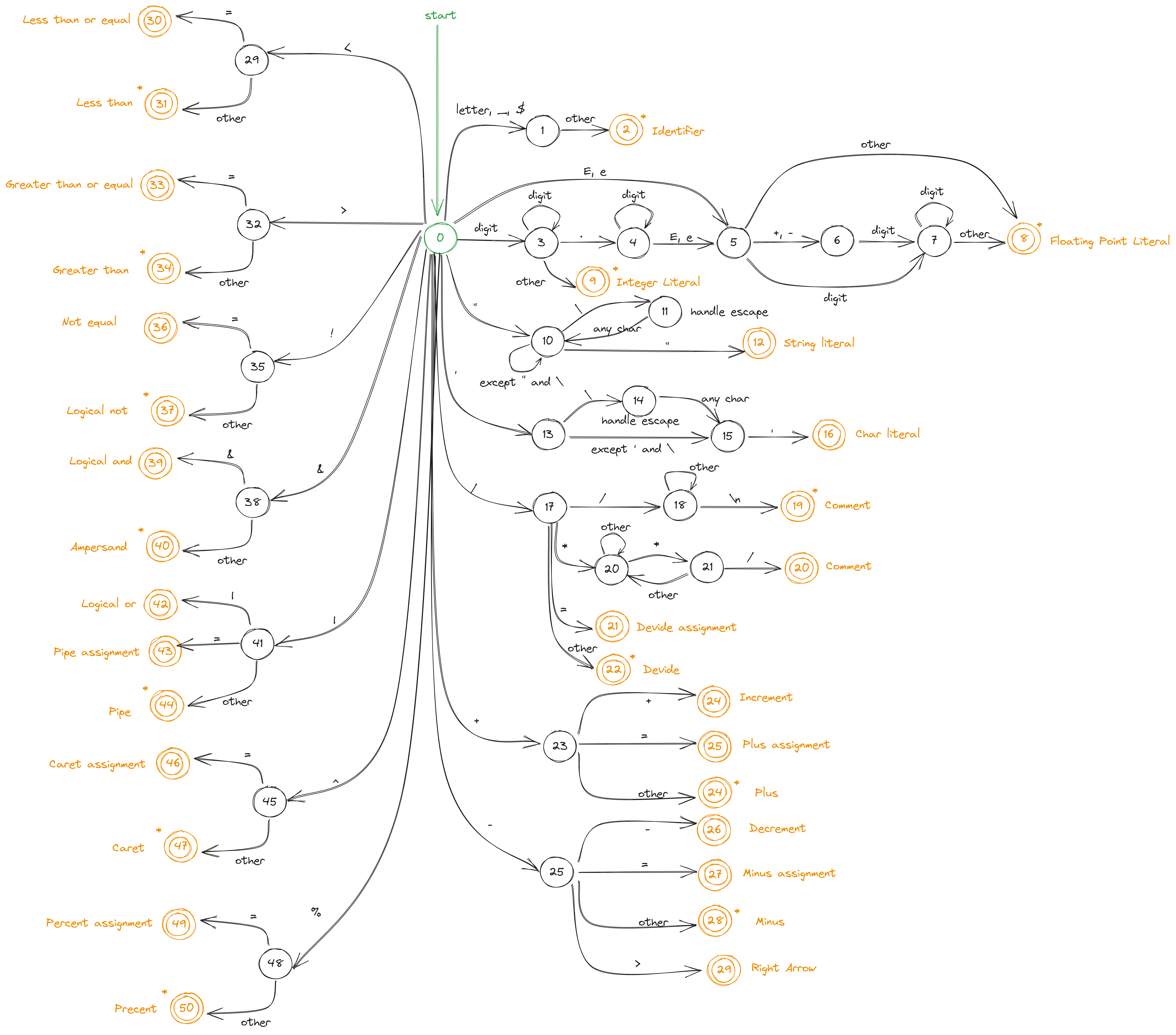Reference: Aho, Sethi, Ullman, Compilers: Principles, Techniques, and Tools, Addison-Wesley, 1986.
The lexical analyser is implemented by hand, using conditions and loops. The state transform graph of the (hypothetical) automata is as follows
The input buffer is implemented using two buffer scheme (buffer pair) which divides the buffer into two parts, each with EOF at the end as sentinels. The implementation can be found in InputBuffer.h and InputBuffer.cpp.
InputBuffer(const std::string& filename)
InputBuffer inputBuffer("test_code")It reads lines from a file and provides interface to access the characters and move forward.
next: move the cursor to the next positiongetChar: get the character at the current positiongetNextChar: first move to the next position, then get the character at that new position.peek: get the character at the next position without moving the cursor.getLine: get the line number of the cursor in the filegetColumn: get the column number of the cursor in the file
the SymbolTable is a dummy table that is implemented for the sake of maintaining the structure of the “compiler”. The implementation can be found in SymbolTable.h and SymbolTable.cpp.
It only supports the following operations:
addSymbol: add the symbol string to the table, return the index in the symbol tablegetSymbol: get the symbol name at the provided index
The Lexer reads strings from InputBuffer and writes symbol details to SymbolTable. It output a Token each time. The implementation can be found in Lexer.h and Lexer.cpp.
Lexer(InputBuffer *inputBuffer, SymbolTable *symbolTable)
InputBuffer inputBuffer("test_code");
SymbolTable symbolTable;
Lexer lexer(&inputBuffer, &symbolTable);nextToken: get as token the next lexeme string from the file
throws LexicalError when encountering un-parseable strings. It reports its position in the file.
InputBuffer inputBuffer("your_test_code");
SymbolTable symbolTable;
Lexer lexer(&inputBuffer, &symbolTable);
for (int i = 0;; i++) {
Token token = lexer.nextToken();
if (token.isWhitespace())
continue;
cout << token << endl;
if (token.getTokenType() == Token::END_OF_FILE) {
break;
}
}The syntax analysis takes Token produced by Parser, and analyses it with ContextFreeGrammar (currently it only supports LL(1) grammar). LL(1) grammar is provided as a list of Productions to the ContextFreeGrammar to produce FIRST and FOLLOW tables to predict the next production to use.
The Parser will do the left-most derivation by maintaining a stack and pushing symbols in the body of the production in reverse order.
GrammarSymbol is a symbol in the LL(1) grammar. It can be either terminal or non-terminal. Terminal symbols are identified solely by their names, while non-terminal symbols adopt the structure of Tokens.Its implementation can be found in GrammarSymbol.h and GrammarSymbol.cpp.
- terminal
GrammarSymbol::createTerminal(Token::TokenType::YOUR_TOKEN_TYPE_ENUM) - non-terminal
GrammarSymbol::createNonTerminal("<symbol-name>") - epsilon
GrammarSymbol::epsilon() - end of file
GrammarSymbol::eof() - invalid symbol: it is only used in a zero-parameter constructor of a
Productionto indicate an internal error.
Currently, the ContextFreeGrammar is exclusively implemented for LL(1) grammars. To construct it, provide a list of Productions. Its implementation is found in ContextFreeGrammar.h and ContextFreeGrammar.cpp.
- Eliminate direct left recursion
- Calculate FIRST and FOLLOW set
- Calculate parsing table (LL(1) prediction table)
- export parsing table (LL(1) prediction table) as csv
Production creation macros: HEAD for the head of the production, NT for non-terminal, T for terminal.
ContextFreeGrammar grammar(
{
Production(HEAD("E"), {NT("E"), T(Token::PLUS), NT("T")}),
Production(HEAD("E"), {NT("E"), T(Token::MINUS), NT("T")}),
Production(HEAD("E"), {NT("T")}),
Production(HEAD("T"), {NT("T"), T(Token::STAR), NT("F")}),
Production(HEAD("T"), {NT("T"), T(Token::SLASH), NT("F")}),
Production(HEAD("T"), {NT("F")}),
Production(HEAD("F"),
{T(Token::LEFT_PAREN), NT("E"), T(Token::RIGHT_PAREN)}),
Production(HEAD("F"), {T(Token::IDENTIFIER)}),
});
cout << "before elimination" << endl;
grammar.printProductions();
cout << endl << "after elimination" << endl;
grammar.eliminateDirectLeftRecursive().printProductions();
grammar.exportParsingTableAsCsv("../app_output/left_elimination_parsing_table.csv");Utilizing a ContextFreeGrammar, it processes every Token supplied by the Lexer, aided by the dummy SymbolTable (which serves a structural role within the "compiler" but does not contribute to actual functionality), in order to analyse the syntax of the provided code.
The implementation can be found in Parser.h and Parser.cpp
It throws a SyntacticalError when encountering un-parseable symbol which does not comply with the grammar.
ContextFreeGrammar yourGrammar
InputBuffer inputBuffer("your_test_code");
SymbolTable symbolTable;
Lexer lexer(&inputBuffer, &symbolTable);
Parser parser(grammar, &lexer, &symbolTable);
parser.parse();